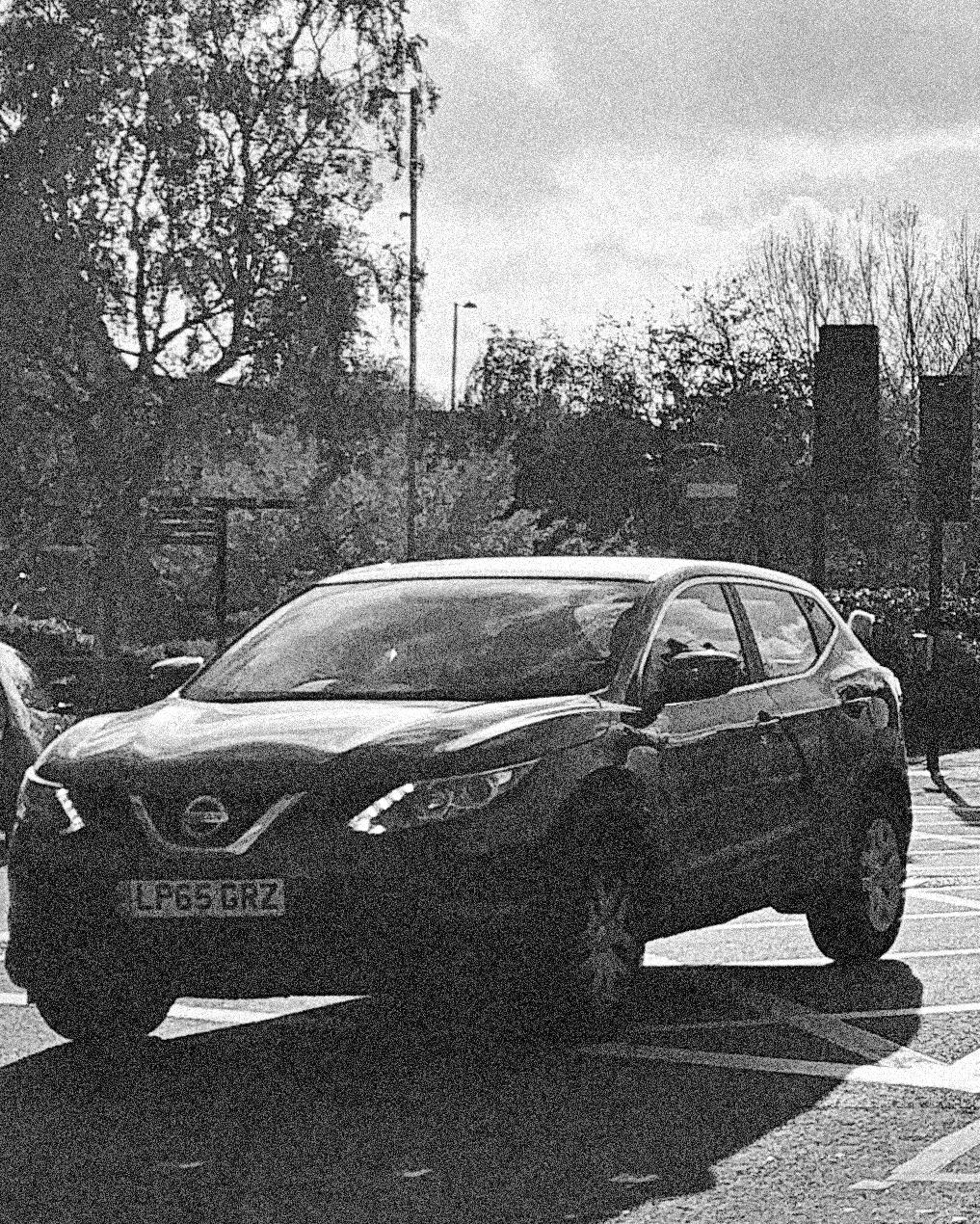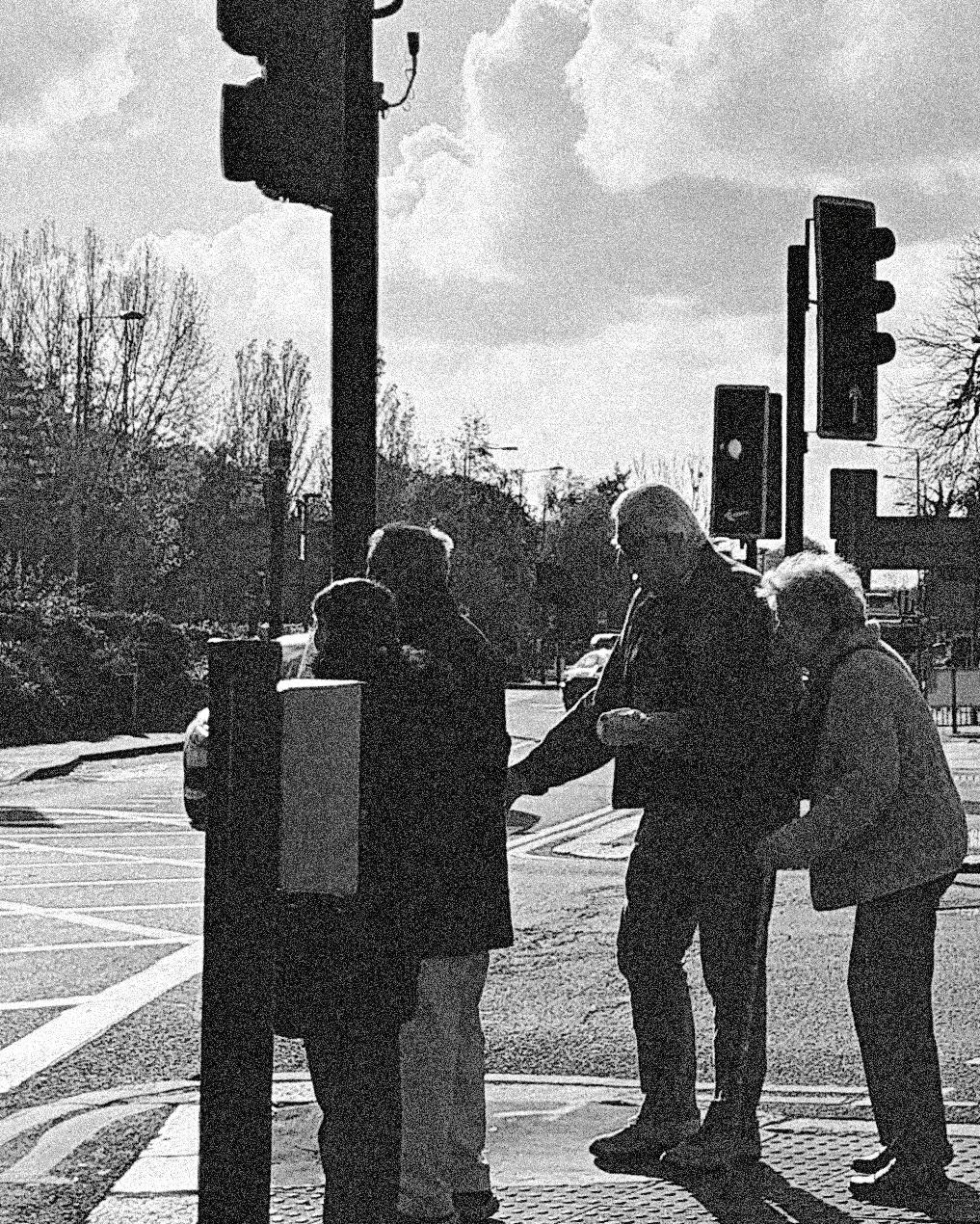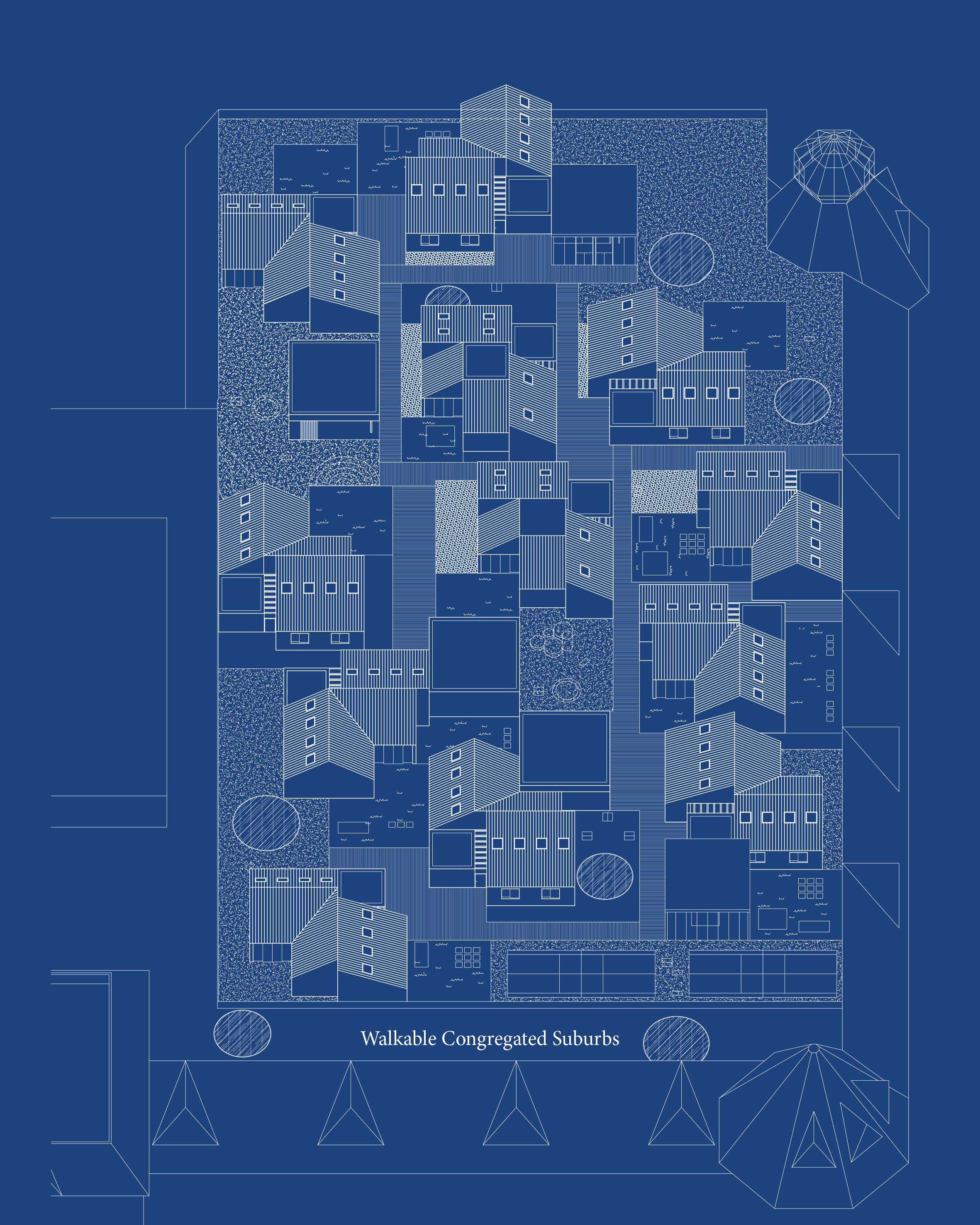
Walkable Congregated Suburbs
to create a city that is elderly-oriented with their pace in their daily life
This publication is dedicated to present the development of a master dissertation project which includes site researches, case studies, analyses, proposed architectural interventions and reflections. Explanations are supplemented with a combination of datas, mappings, graphical schemes, drawings and technical information.
Cover image by Hiu Yu ONG
Layout and editing by Hiu Yu ONG
Copyright © 2019 by Hiu Yu ONG
All rights reserved.
No part of this publication may be reproduced, stored in retrieval system or transmitted in any form or by any means, electronic, mechanical, photocopying, recording or otherwise without the prior written permission of the copyright owner.
Contact
Hiu YU ONG hiuyu.ong@gmail.com
International Master of Science in Architecture
KU Leuven, Faculty of Architecture
Campus Brussels
Academic year 2018/19
June 2019 arch.kuleuven.be internationalmasterofarchitecture.be
Walkable Congregated Suburbs
to create a city that is elderly-oriented with their pace in their daily life
Master Dissertation Project
Author: Hiu Yu ONG
Academic Promotor: Anuschka Kutz
Publication: 20/06/2019
Academic Year: 2018/2019
Master of Science in Architecture
Faculty of Architecture, Sint-Lucas Brussels Campus, KU Leuven
Current
Building
Walking
Introduction & Inspiration
Inspiration from Movie Introduction








8 clips were extracted from the Movie ‘Happiness’ which illustrates a home of an old lady and different moments while living with her young tenant in 2015. ‘Happiness’ is a movie about living interaction and moments between the old lady (Fan) who is a cognitive disorder patient and a young man (Yuk) who has been abandoned by his father. Fan is a host and she has owned her flat since she was young. She met Yuk accidentally and allowed him to rent one a room in her flat. However, she asked him to strictly follow her timetable and routines in the living room.
1. Screen images capture from the Movie ‘ Happiness’ Happiness (幸運是我), Hong Kong Movie, 20161
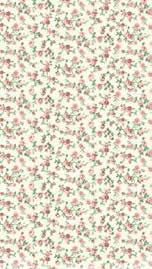




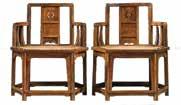
What makes a ‘home’, element extracted from ‘Happiness’
Everything in her flat shows certain structure of time. The whole setting of the room shows the living elements in 80s-90s in Hong Kong. For example, the photo in her youth, home radio, broken clock and window, traditional Chinese furniture, old television, wallpaper in flower pattern. These are the artifacts that can be found in her living space she wants to keep everything unchanged because she is not familiar with new things. In the movie, a lot of conflicts illustrated between Yuk and Fan because of the different values between them. It also reflects the different habits and views of the young and old.
Introduction & Inspiration
Inspiration from Movie Introduction
Aging is a global issue which we have to face, and it is impossible to ignore. The movie captures the daily life and challenge that an elderly will tend to be faced with. Elderly are all around us most of the time but at the same time they become more and more invisible. They are even not given a second glance. However, they have richer experiences and stories to tell than the rest of us. As mentioned from the movie, there is a huge gap between the young and old not just the age difference, but also the experiences, cultures and growth environment. That is what is called the generation gap.
“home as a concept was found to have different meanings for different older people, depending on where they lived, their personal and family history, their social connections and environmental conditions. Differences in the meaning of home for older people living in small remote communities and those living in the city were noticeable.” (Roin, 2015, p.22)3
From the different point of views of a living space, personal elements and spaces are various, not just because of ages. How to facilitate people in a communal or shared space? Elderly may feel comfortable while staying in their own houses but how about if they are on the street or even in the supermarket? Are they still in their comfort zone while staying outside? Are they familiar with the unknown space? Is there any possibility to extend their ‘home’ boundary?
First Part of the Research Question: How to extend the home boundary to help the elderly to be more familiar with the communal space? The following research analysis and strategy are based on the macro and micro scale so as to experiment how to facilitate the young and old (multigeneration) in the town and how to help the elderly to be more familiar with the communal space so as to extend their comfort zone.
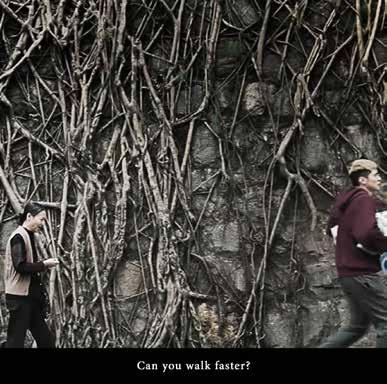
Definitions of ‘Home’
“home is powerful, emotive and multi-faceted and that the idea and place of home is typically configured through a positive sense of attachment.”
Gorman-Murray and Dowling, Editorial, “Home”, 2007, paragraph 4
“These are affectionate images of home as a pattern of regular doings. other images are frankly hostile. The very regularity of home’s processes is both inexorable and absurd.”
a home is not only a space, it also has some structure in time; and because it is for people who are living in that time and space, it has aesthetic and moral dimensions.
Mary Douglas, The Idea of a Home: A Kind of Space, 1991, p.288 and p.289
Is home a personal space?
There are many definitions of what ‘home’ is. Mary Douglas defined home as being located in space, but this space does not necessary need to be a fixed space (Douglas, 1991)4. “Home is the symbol of privacy, a place where a handful of people live in a close, intimate relationship” (Madanipour, 2003, p.63). “Home is powerful, emotive and multi-faceted and that the idea and place of home is typically configured through a positive sense of attachment” (Andrew Gorman-Murray and Robyn Dowling, 2007). Home has an important relationship between people’s memories, life, personal experiences and emotions and times. It can be physical or spiritual. A personal space can be formed at home in both visible and invisible way. ‘Home’ can be a whole personal space if the person is living alone. In care homes, each older adult has their own private sphere (invisible personal space), there are various private spheres in the same public sphere (care homes). As mentioned by Ali Madanipour, personal space is portable5. Therefore, personal space can be in anywhere, on the street, in the shopping mall, parks etc.
4: The Idea of a Home: A Kind of Space p.289
5. ‘Home’ , paragraph 4
6. Public and Private Spaces of th’e City p.28
Introduction & Inspiration
Definitions of ‘Home’
Personal and Impersonal Space
Personal space is invisible and individual. Different people have various kinds of personal spaces, which depends on the differences influences such as cultural and growth environment, economic situation, experiences and ages. It can be affected by external and internal factors. “Personal space is defined as a small but invisible protective sphere or bubble that individuals maintain around them” (Madanipour, 2003, p.19)7. It is a private space that not everyone can come in as it is the inner part of a realm between people. Everyone has their own personal spaces all the time even just walking on the street. Somehow, the impersonal and personal space overlaps, for example people who are walking an impersonal space of a busy street, but he /she may have a strong personal sphere that he/she does not want to interact with anybody. Allan Silver mentioned that personal is private and impersonal is public8 (Silver, 1997, p.43). However, sometimes there are some ambiguities of what public and private are because they can be overlapped.
However, the notion of ‘home’ seems to identify the boundary of home. Personal space creates private sphere. It is not shared by somebody, and entry of public is prohibited. It is usual as it is a personal space. What if the ‘home’ can also be an impersonal space? Extending this ‘home’ boundary is not really sharing your private space but making people feel safe and comfortable while staying in communal space.
Introduction & Inspiration
Definitions of Home Care, Care Home and Nursing Home
Comparison
HOMES
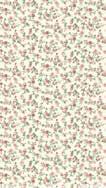
PAIR SINGLE


‘PERSONAL ELEMENTS’ IN THEIR LIVING SURROUNDING
CARE HOMES / INSTITUTION CARE
MEDICAL AND NON-MEDICAL CARE 24/7
STAFF SERVICES
NEW SURROUNDINGS
DIETARY / ACTIVITIES RESTRICTIONS
Caretakers / Nurses
Older Adults
WHEN PEOPLE ARE GETTING OLDER, THEY MAY NOT BE ABLE TO PERFORM EASY DAILY TASKS…
HOME CARES

PAIR SINGLE


‘PERSONAL ELEMENTS’ STILL IN THEIR LIVING SURROUNDING CARETAKERS / NURSES IN THE HOUSE
NURSING HOMES
HAVE AN ILLNESS OR MEDICAL CONDITION
FREQUENT MEDICAL ATTENTION, NURSING CARE 24/7
NEW SURROUNDINGS
DIETARY / ACTIVITIES RESTRICTIONS
Older Adults with Medical Needs
Personal Element Lost in typical institutional Care




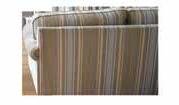
Personal element is one of the components of people’s comfort zone. Most of the care homes may lost this kind of element because they are new environment for the elderly, and they are only for medical and non-medical care for the older people who live there.
Introduction & Inspiration
First Trip to London
Personal Elements - Sense of Belongings and Familiarity
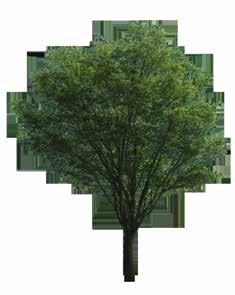

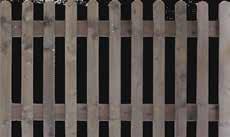
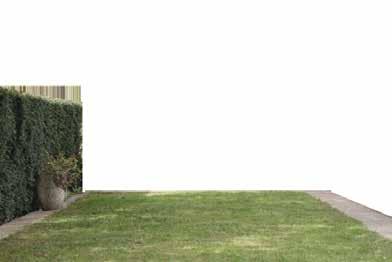
The idea of extending the ‘home’ boundary became more solid after having a conversation alias Mr A from Positive Aging Council. Home is an intimate space. People where personal elements can be found in that physical personal space. Personal element is thing for a person, personal space and living place. It can be visible or invisible. It is a ‘emotional bond’ (D.Rowles, 1983) among the space and people. It provides the sense of identity, belonging to the person crucially. People will feel more familiar to the space in which they can find interconnection, identities and selves in that space. It also explains the reason why the people want to stay in specific place.
Personal Elements - Sense of Belongings and Familiarity

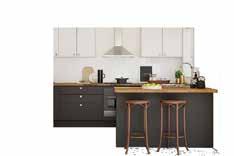
Like in John’s case (on the adjacent page), John has moved to his new terraced house a few years ago. Although this is not a place where he used to live in, he loves living in this ‘new’ area. There is a garden with garage area where he can park his own car. A stair lift has been installed in his terraced house which makes him much more convenient to go up and down. The house is much bigger than the apartment he lived in before which provides more space for his lovely dog.
First Trip to London
Personal Elements - Sense of Identity and Familiarity
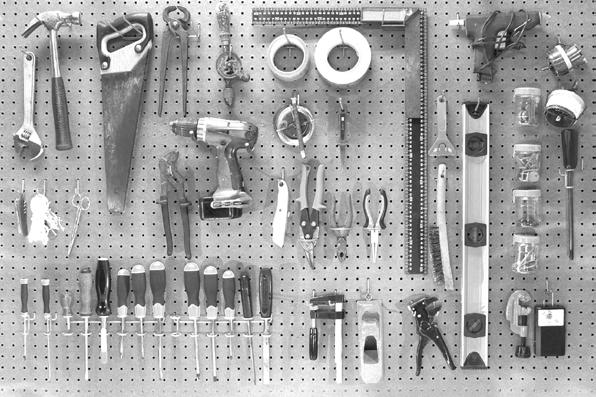
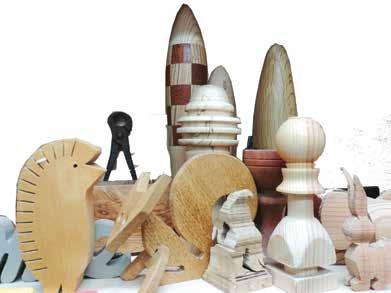
Men in Sheds is a concept founded in the 1980s in Australia that provides a welcoming space for retired older men to engage in woodworking, skills sharing and socialising. It is another ‘home’ for them to have entertainment, identification and familiarity after retirement and helping others. They have developed a strong social network with the community, to private households and schools. The well-equipped wood workshop, where they create hand-made toys and home products expanded their sense of comfort from home.
Personal Elements - Sense of Identity and Familiarity



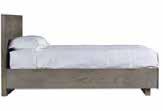



This is a prayer’s bedroom in a care home - Aahina House. Faith, gods or religious provides a certain sense of security to people. Placing home shrine, statues, domestic altar or other Hinduism paintings in the bedroom of the care home can enhance a sense of identity and familiarity when the elderly moved to the unfamiliar care home.
Men in Shed tools, handmade toys & decoration





Personal Artifacts
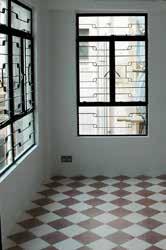
One of the Bedroom of Aahina House home shrine, statue, domestic altar, hinduism paintings



One of the Bedroom of Aahina House home shrine, statue, domestic altar, hinduism paintings




Extraction from ‘Happiness’ wallpaper, traditional bowls & furniture, old window and equipment
HK Movie (Happiness) Extraction, Elderly’s Home wallpaper, traditional bowls, furniture, window, equipment


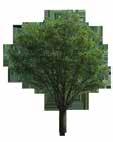
Men in Sheds tools, hand-made toys & decoration
Men in Shed tools, handmade toys & decoration home
Invited Guest: John’s Home garden, kitchen, dog, stairlift

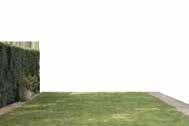
Personal Artifacts

Men in Shed tools, handmade toys & decoration
Invited Guest: John’s Home garden, kitchen, dog, stairlift




One of the Bedroom of Aahina House home shrine, statue, domestic altar, hinduism paintings
One of the Bedroom of Aahina House home shrine, domestic altar, statues & hinduism paintings
HK Movie (Happiness) Extraction, Elderly’s Home wallpaper, traditional bowls, furniture, window, equipment
John’s Home garden, kitchen, dog & stairliftCroydon is a London borough located in the southern part of London. It is also one of the largest commercial districts outside Central London as mentioned by the Mayor of London in 2008. During the London trip in November 2018, I visited Central Croydon. e public transport network is well developed, including train, bus and tram connected to di erent parts of Croydon and the centre of London. e diversity of land use in the city centre improves the quality of live, convenience, movability including shopping mall, o ces, residential development, housing, houses, schools, communal space etc. However, most of the older adults live in East and South Croydon instead of the centre. Although East and South of Croydon are not far away from the centre (it takes 30-45 minutes by bus), bus is the only public transport to go to the city centre. With the increasing elderly population in 2030, there will be a larger demand on public transport, communal facilities and housings.
HIGHER NUMBERS OLDER PEOPLE 65+
Population and Age 65+

NUMBER OLDER PEOPLE 65+
OF CROYDON POPULATION 13%
Age 65+ in 2018
600 - 1200
1201 - 1500
1501 - 1700
1701 - 2050
2051 - 3750

OF CROYDON POPULATION 17%
Age 65+ in 2030
700 - 1700
1701 - 2000
2001 - 2300
2301 - 2700
2701 - 4300
Source: London DataStore, https://data.london.gov.uk/dataset/ward-profiles-and-atlas
Source: London DataStore, https://data.london.gov.uk/dataset/ward-pro les-and-atlas
Chosen Project Area
Demographic in London
Population and Age 16-64
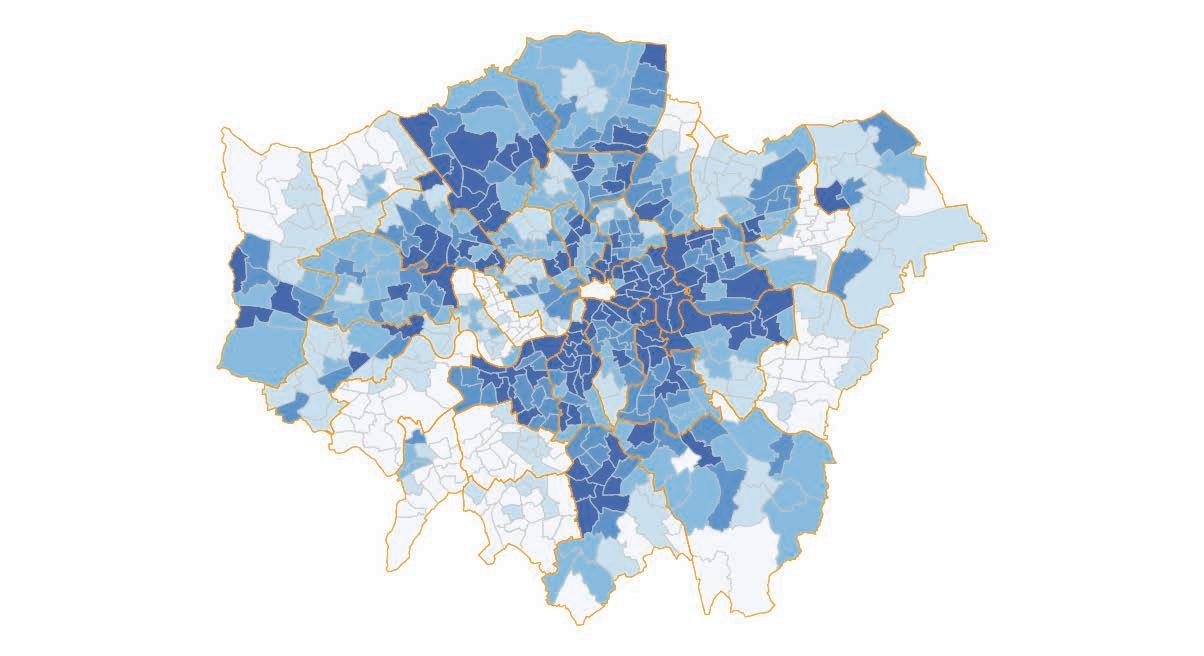
NUMBER
PEOPLE 16-64
PEOPLE 16-64 OF CROYDON POPULATION
62%
Age 16-64 in 2018
3400 - 7500
7501 - 8920
8921 - 10250
10251 - 11590
11591 - 26250
64% OF CROYDON POPULATION
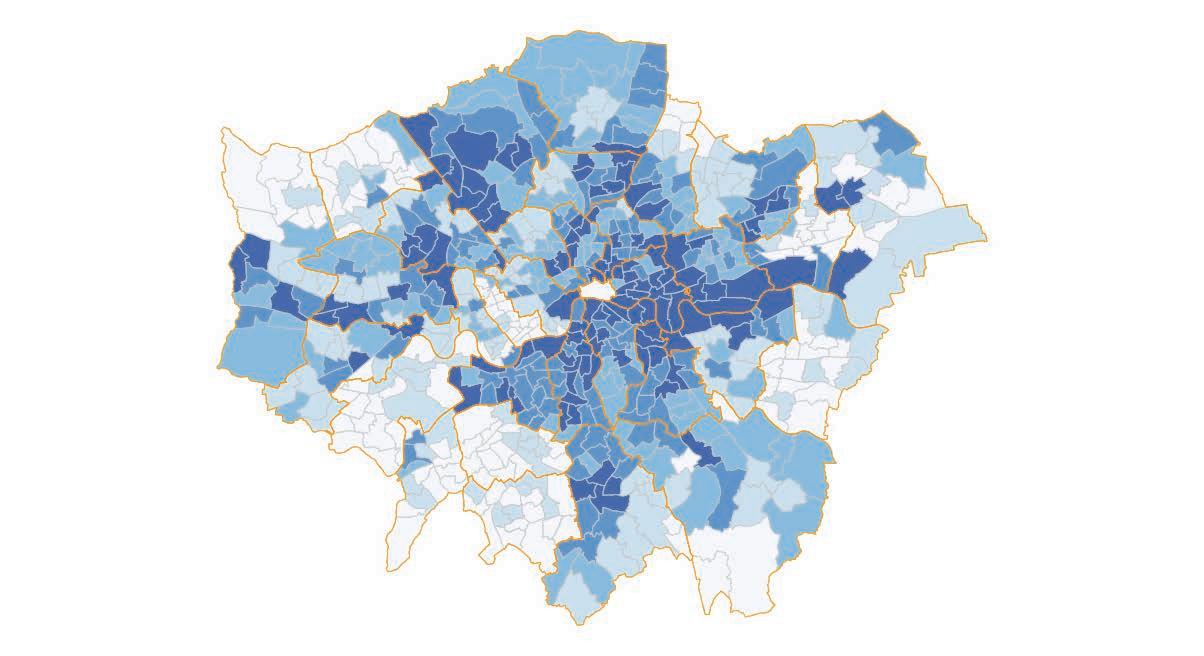
Age 16-64+ in 2030
4200 - 7700
7700 - 9400
9400 - 10880
10880 - 12600
12600 - 50100
Source: London DataStore, https://data.london.gov.uk/dataset/ward-profiles-and-atlas
Source: London DataStore, https://data.london.gov.uk/dataset/ward-pro les-and-atlas
PEOPLE 0-15
Population and Age 0-15
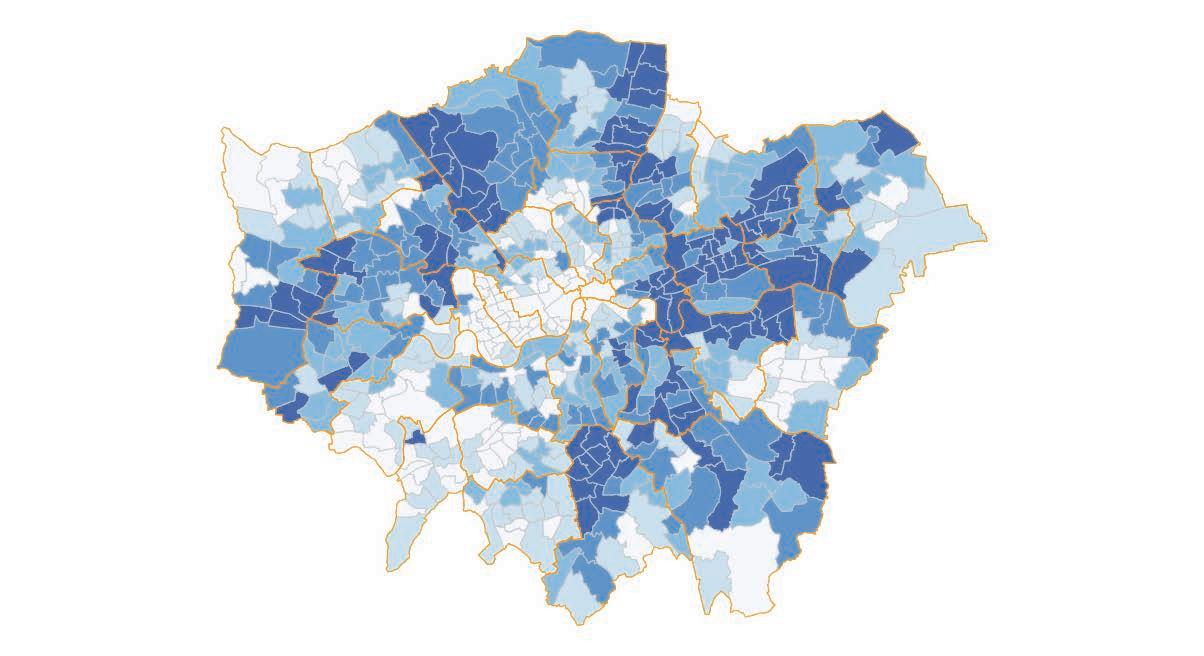
STABLE NUMBER
PEOPLE 0-15
OF CROYDON POPULATION 22%
Age 0-15 in 2018
850 - 2150
2151 - 2600
2601 - 3100
3101 - 3600
3601 - 6250

OF CROYDON POPULATION 21%
Age 0-15 in 2030
750 - 2150
2150.1 - 2570
2570.1 - 3000
3000.1 - 3750
3750.1 - 9850
Source: London DataStore, https://data.london.gov.uk/dataset/ward-profiles-and-atlas
Source: London DataStore, https://data.london.gov.uk/dataset/ward-pro les-and-atlas
Chosen Project Area
Demographic in London
Future Scenario of Croydon
AFTER 12 YEARS...2030
GROWING POPULATION OF ELDERLY 65+
13%17% POPULATION IN CROYDON 11%
NEEDS
HIGHER PROPORTION OLD PEOPLE 65+
HOUSING COMMUNAL FACILITIES
TRANSPORTATION NETWORK LOCAL SHOPS...ETC.
Data from London DataStore, https://data.london.gov.uk/dataset/ward-pro les-and-atlas






Future Scenario of Croydon


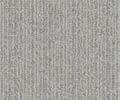



PAIR SINGLE RETIREMENT HOME PEOPLE MIGHT THINK THAT... OLD PEOPLE WILL ONLY LIKE TO STAY IN THEIR COMFORT ZONE = HOME

OLD PEOPLE WILL LIKE TO DO DIFFERENT THINGS WHEN THEY RETIRED
DRAWING
EXERCISING LECTURES / TALKS
TRAVELLING
GARDENING
NOT TRUE NATURE TRIPS
DANCING
EXTENDING THEIR COMFORT ZONE TO NEIGHBOURHOOD / OTHER PLACES
THE OLD PEOPLE ALSO HAVE...
LARGE DEMAND ON COMMUNAL FACILITIES PUBLIC TRANSPORT
Chosen Project Area
Demographic in London
Zoom-in Demographic in Croydon - Population % of different groups in Croydon
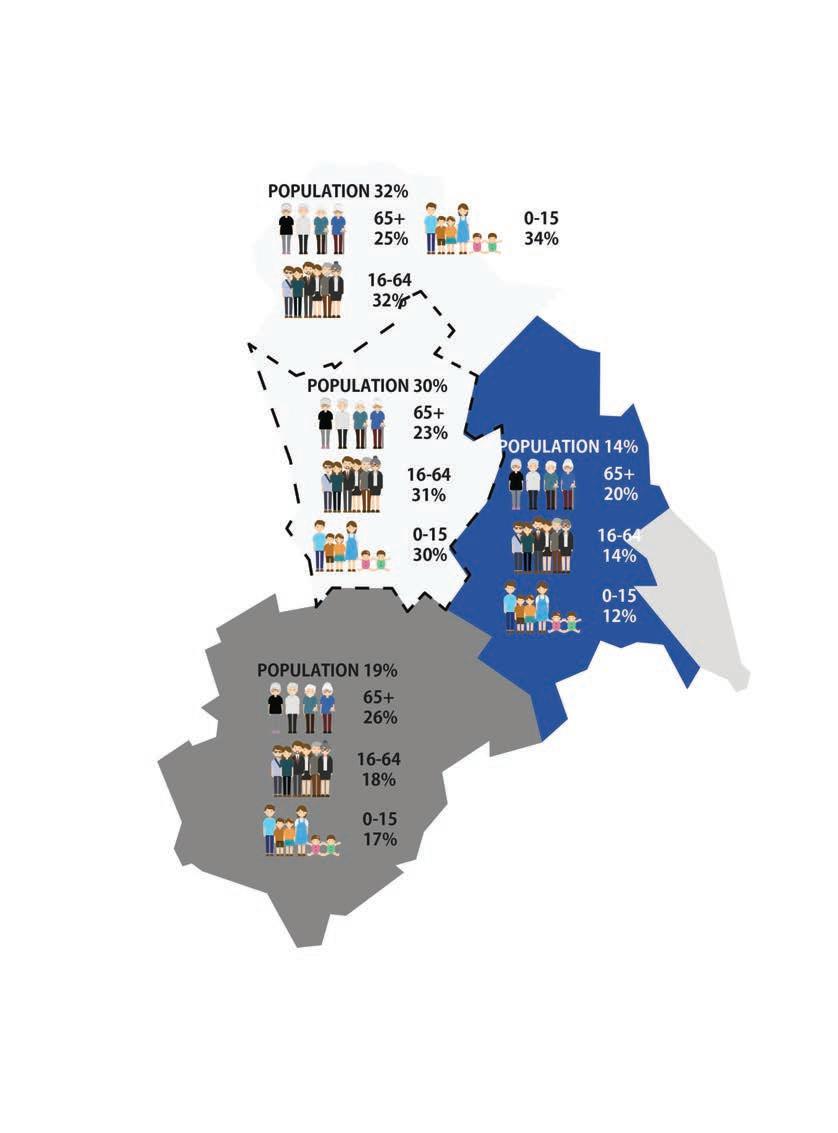
Data from London DataStore, https://data.london.gov.uk/dataset/ward-pro les-and-atlas
AIRPORT & DIAMOND
Existing Infrastructure in Croydon
CENTRAL LONDON
District Centre
Neighbourhood Centre
Road
Railway Tram
Railway Station
Central Croydon
East of Croydon
South of Croydon
Reference: Croydon Local Plan, www.croydon.gov.uk
Reference: Croydon Local Plan, www.croydon.gov.uk
Chosen Project Area
Demographic in London
Problems Found / Potential
CENTRAL LONDON
WEST CROYDON
Potential Loose Space lack of transportation network only can be access by car high portion on elderly lack of diversity of land use
GATWICK AIRPORT & DIAMOND EAST CROYDON PURLEY NORBURY
Chosen Project Area
Urban arrangement of South Croydon
Zoom-in of South Croydon
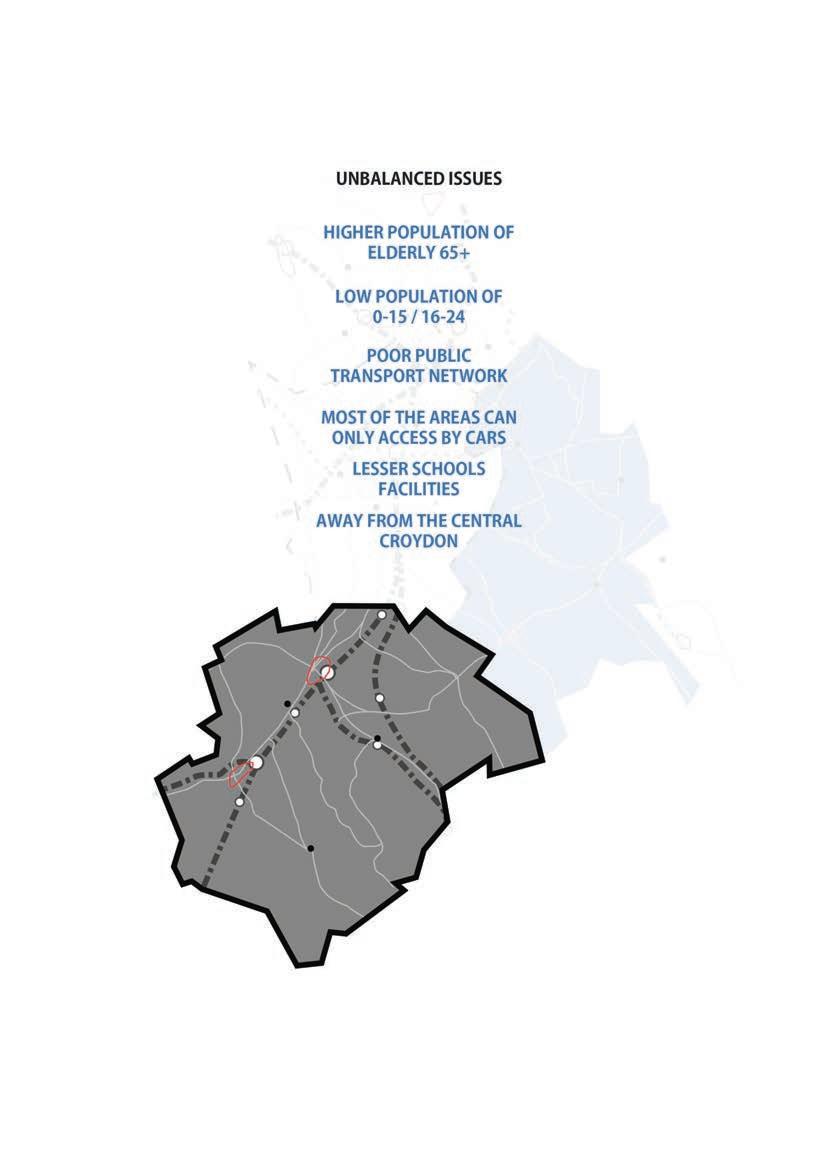
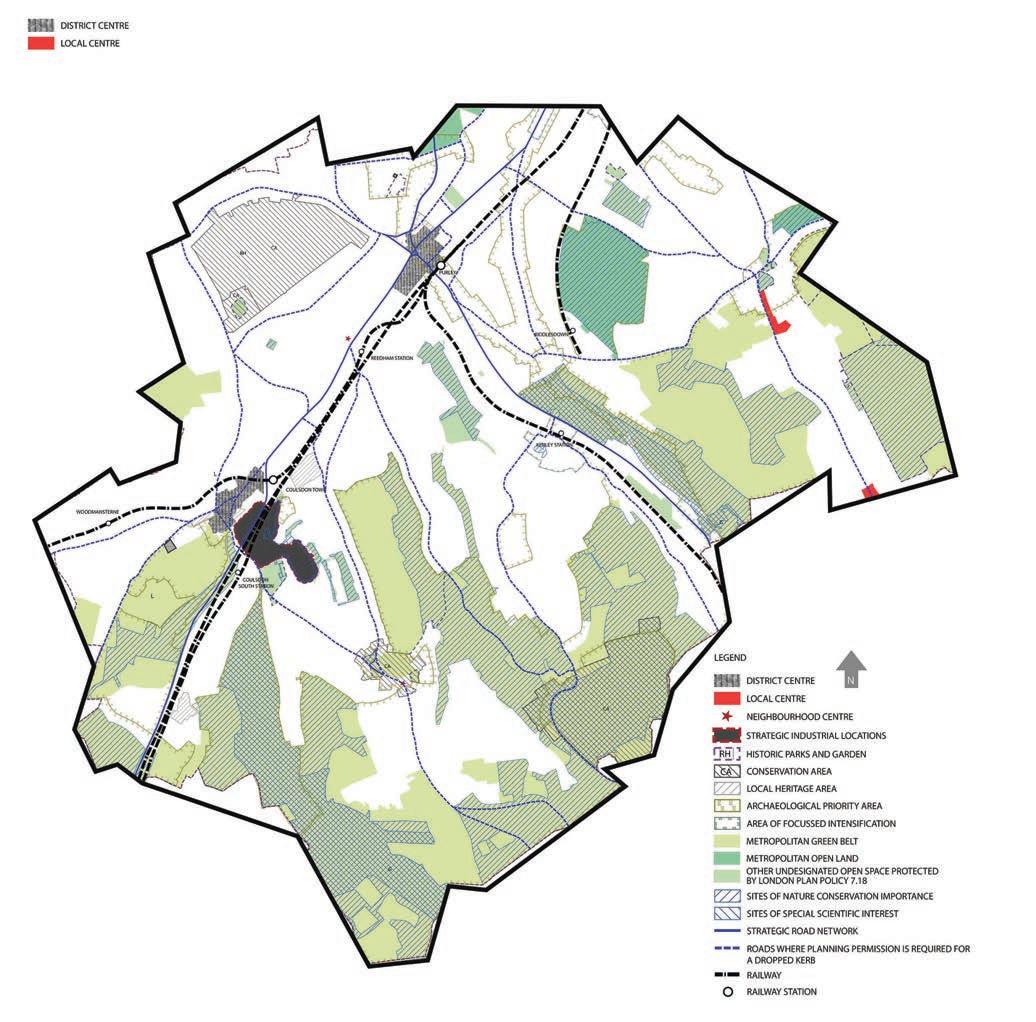
Chosen Project Area
Urban arrangement of South Croydon
Existing
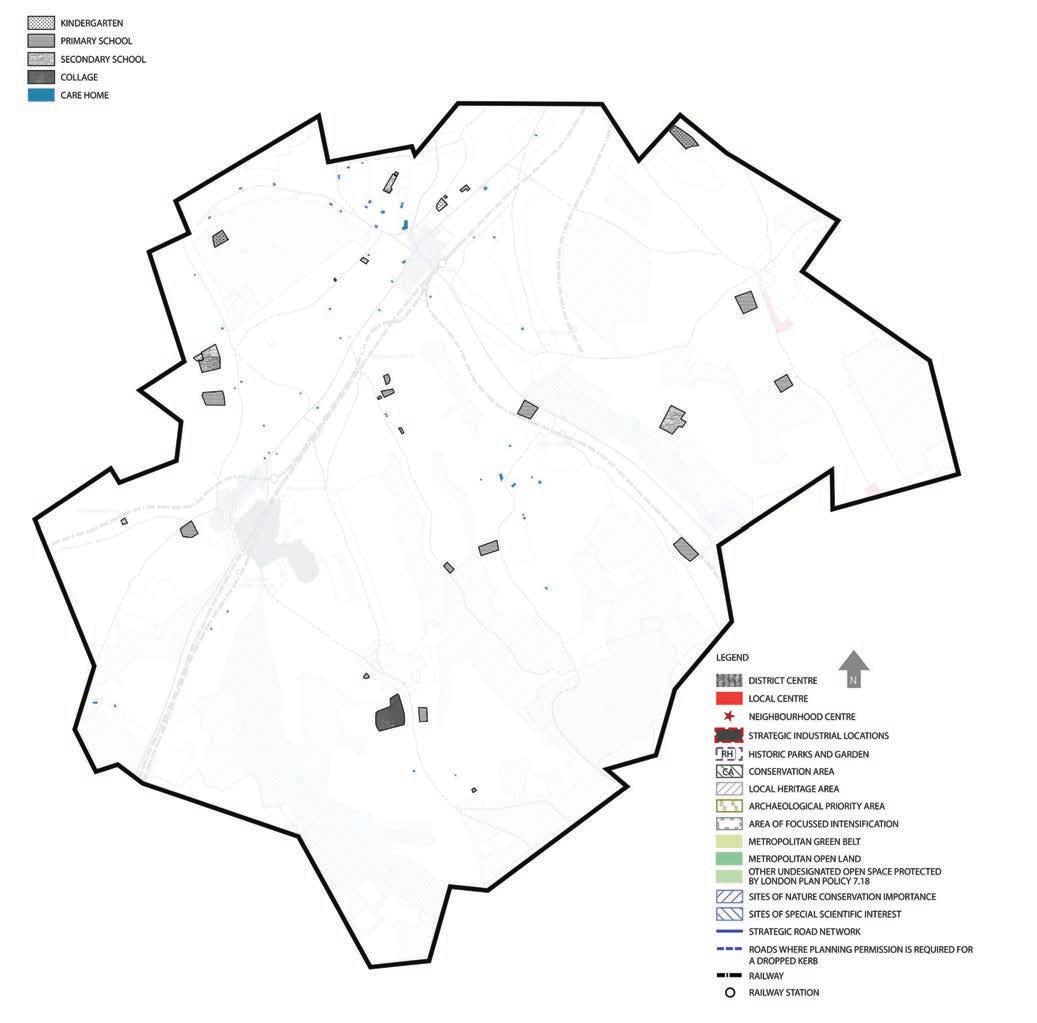 Schools and Care home in South of Croydon
Schools and Care home in South of Croydon
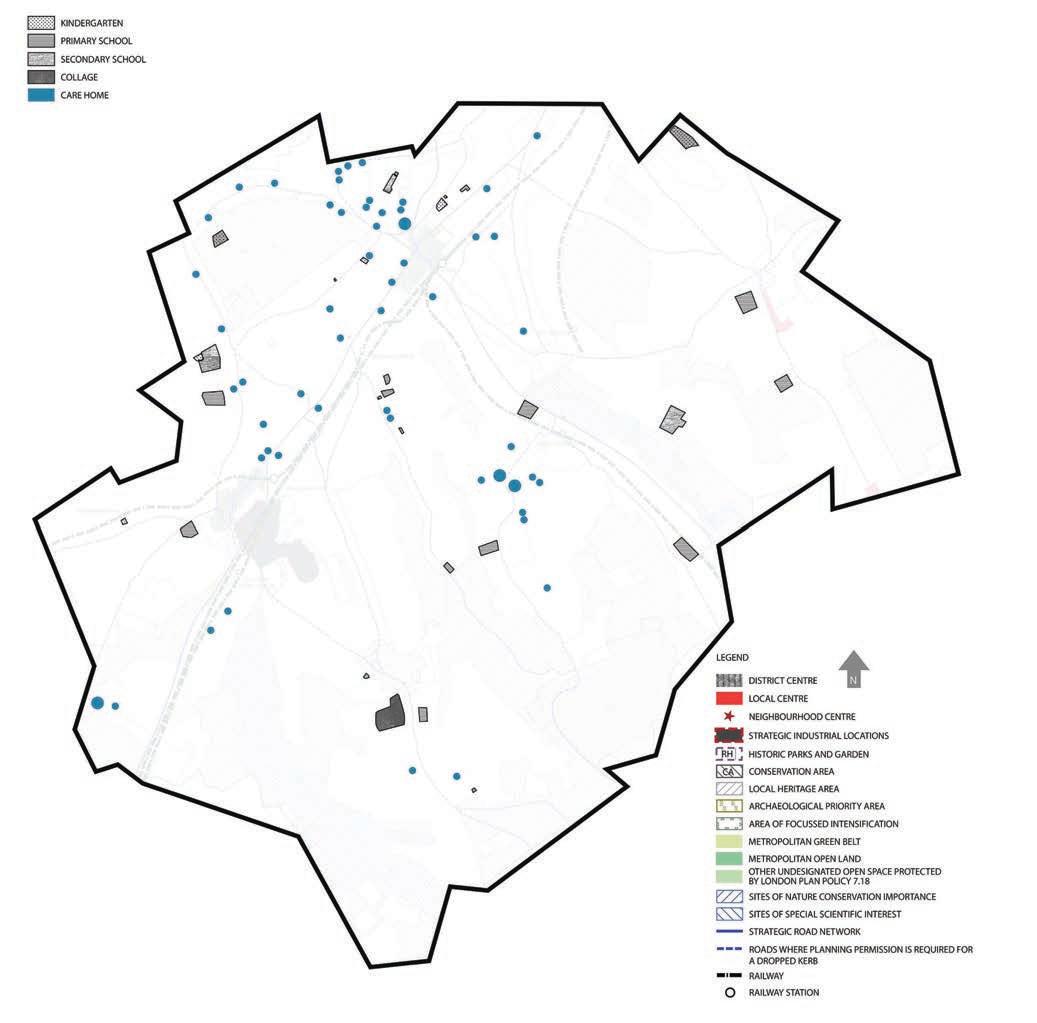
Purley is a place located in south Croydon where there is a higher percentage of elderly people, but a lower percentage of younger people in comparison with London as a whole. e unbalanced population also relates to a poor public transportation network. ere is a huge dependency on cars in Purely as the entire suburban structure has been built upon the needs of individual transportation. People can only access Purley by train, buses and with cars. Communal facilities are also rare in Purley because most of the land is dedicated to detached houses located around the centre of Purley. Many borders are created by the privatized amenities, for example, the terrace houses, gated detached houses, care homes and schools. e public can only access supermarket, cafes, restaurants, laundry, salons in the centre. e public accessibility is limited by the planning. e restriction of the accessibility is much stronger without paying anything. ere is only one park, two churches and one library nearby.
From the planning point of view, care homes and schools are separated from each other, meanwhile, they are closed to each other. is can be a great opportunity to blur the borders between them. ere are potentials that can be found in Purley. ere are di erent organization who will hold various events in Purley, like Purley Cross Centre, Purely Youth Centre, South East Cancerhelp Centre and BID in Purley. ey organised many activities and courses for the communities such as computer, yoga courses, live bands, food and drink festival, Christmas parties etc. Unfortunately, most of them do not receive any funding from the government, so there are annual membership fees or charges to citizens for events.
e unhealthy urban structure, including the concentration of public amenities in the centre, huge dependency on individual transportation, neatly divided privatised lots and detached houses, Purley has been segregated from the centre of Croydon not only the graphical location and the infrastructure, but also the current pattern of ageing population. Purley is typical suburban area that can be used as a prototype testing on how to integrate Purely into communal – elderly friendly city.
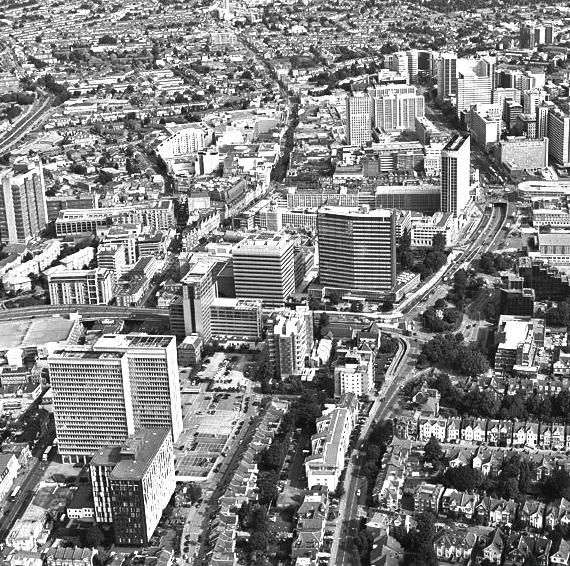

1: Source from https://developcroydon.com/brand-croydon-behind-surge-in-prices/
2. Source from https://c8.alamy.com/comp/G7BE26/purley-stock-G7BE26.jpg
Chosen Project Area
Purley as Chosen Site
Current Situation
Huge Dependency on Cars
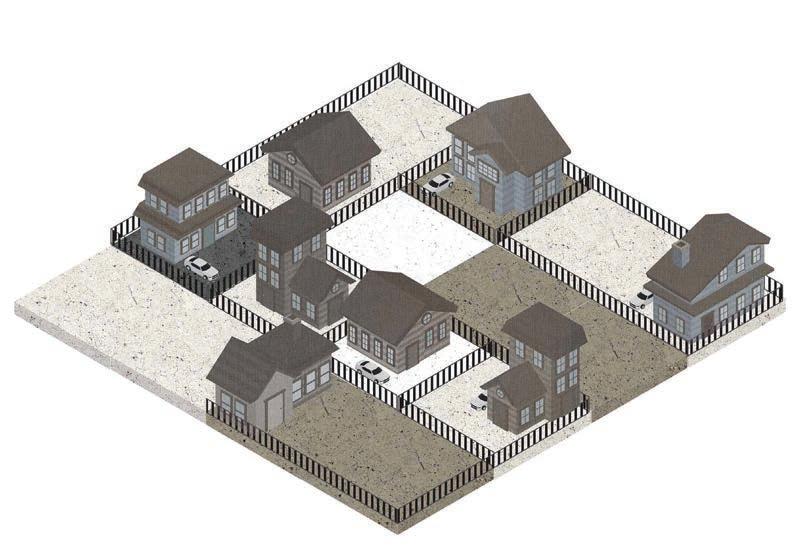
Impression of Purley
Boundaries Created by Privatised Amenities: Terrace Houses, Cares Homes, Schools Cares Home School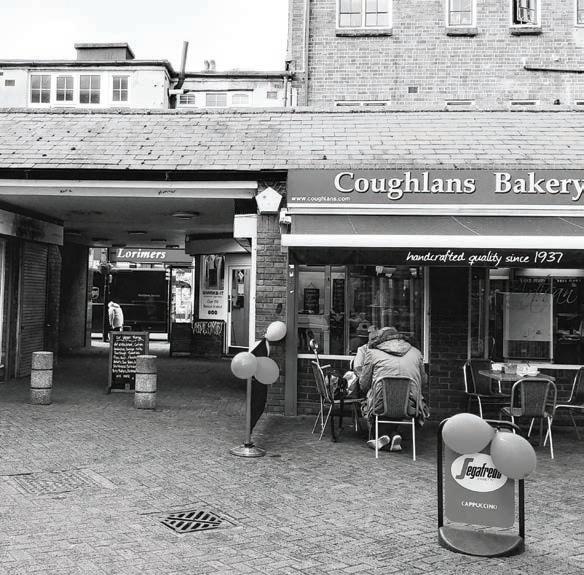
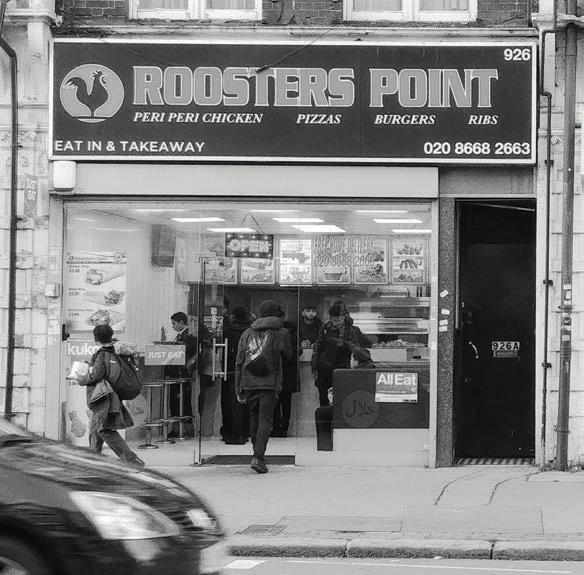
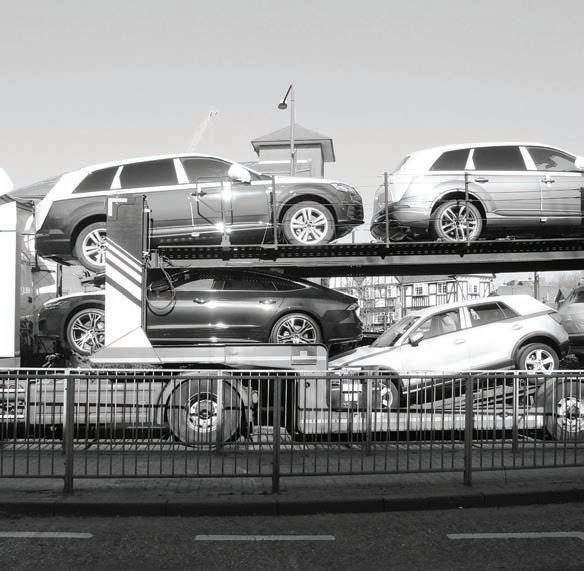
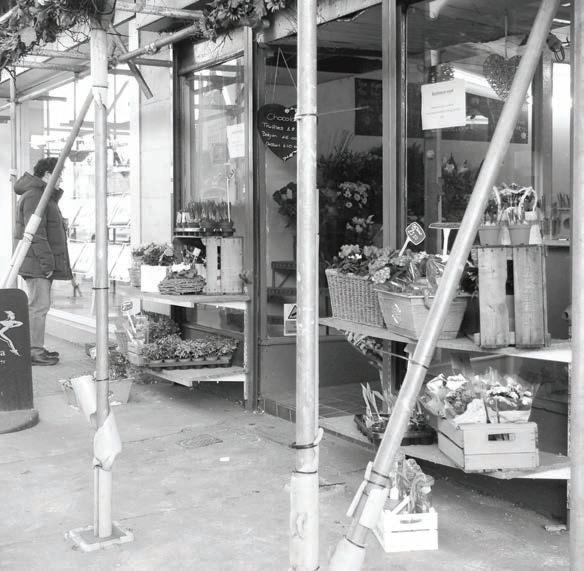 Truck Passing Purley Road (Nearby Tesco)
Renovation above the Flower Shop (Chesterman Florist)
Truck Passing Purley Road (Nearby Tesco)
Renovation above the Flower Shop (Chesterman Florist)
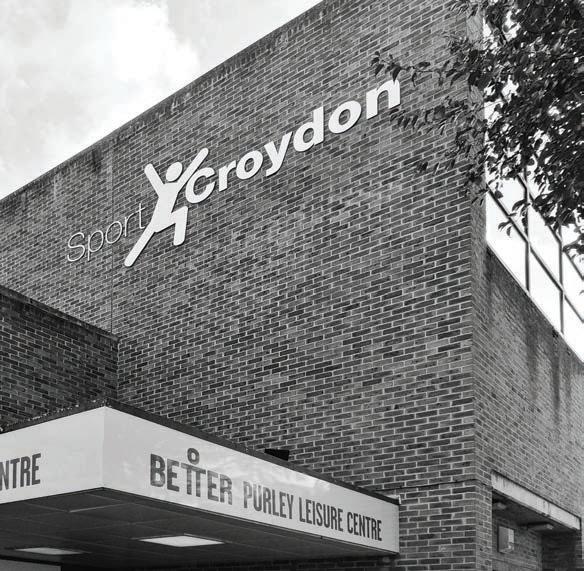


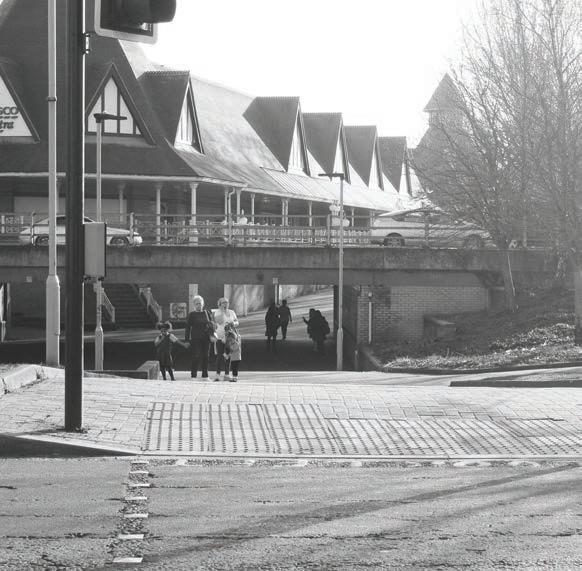 On the Way Back Home from Tesco
On the Way Back Home from Tesco


